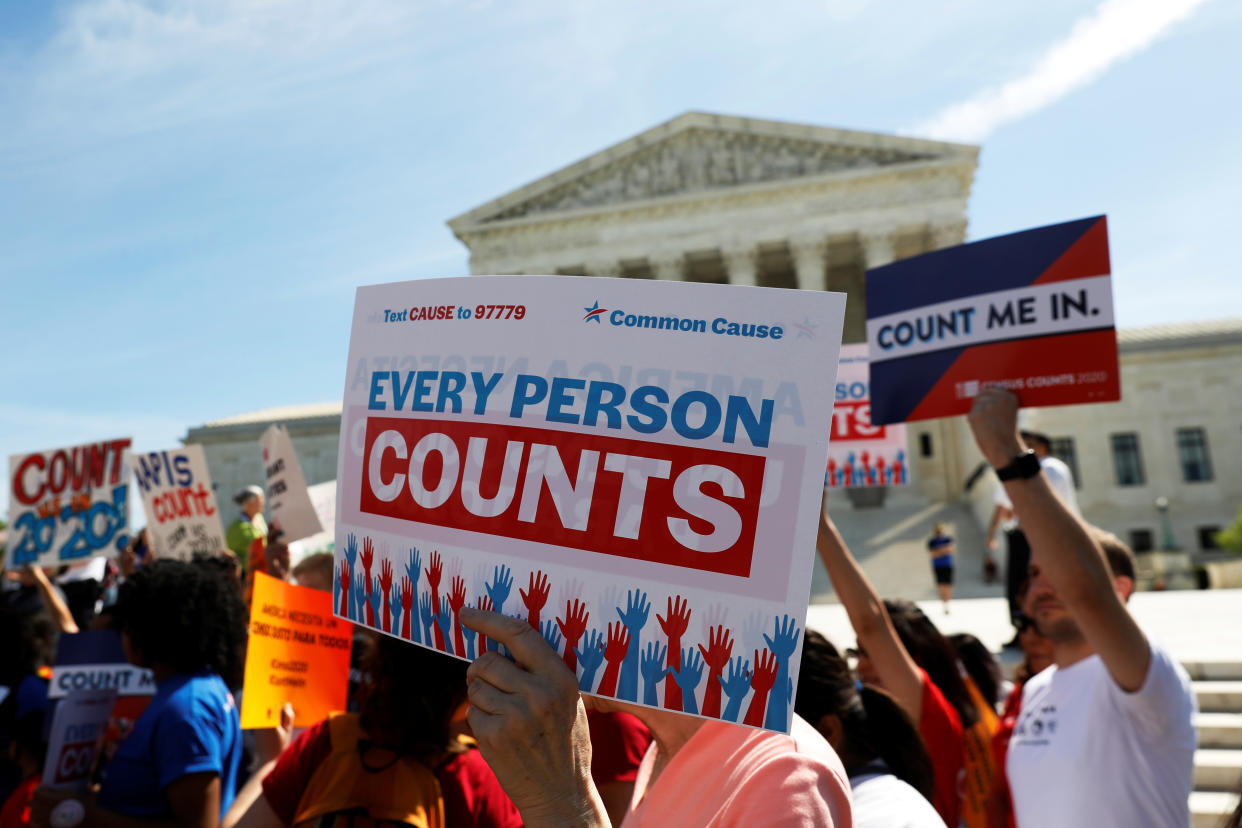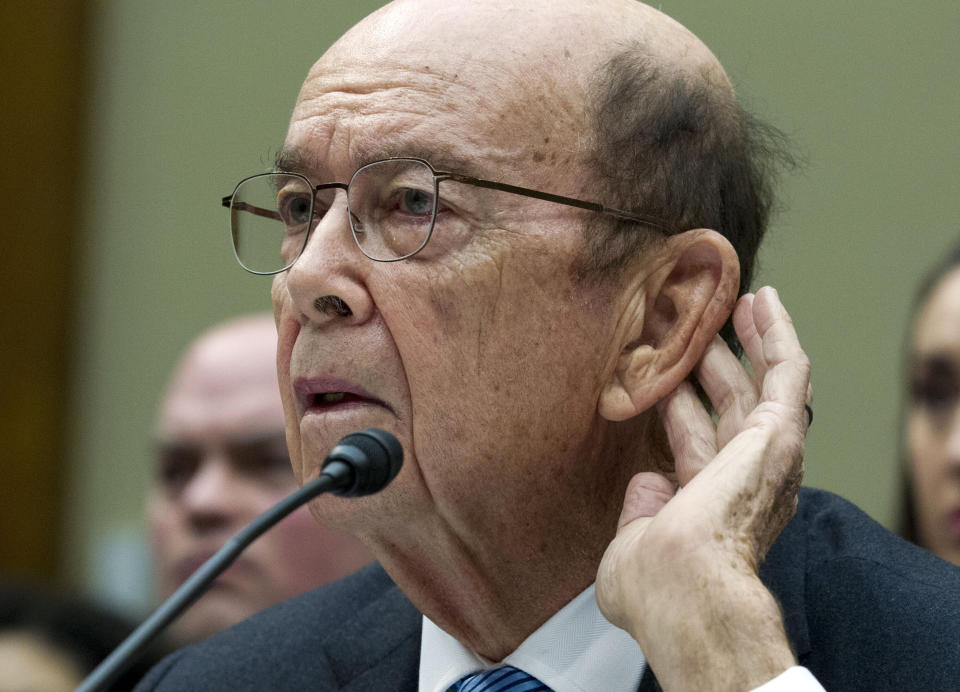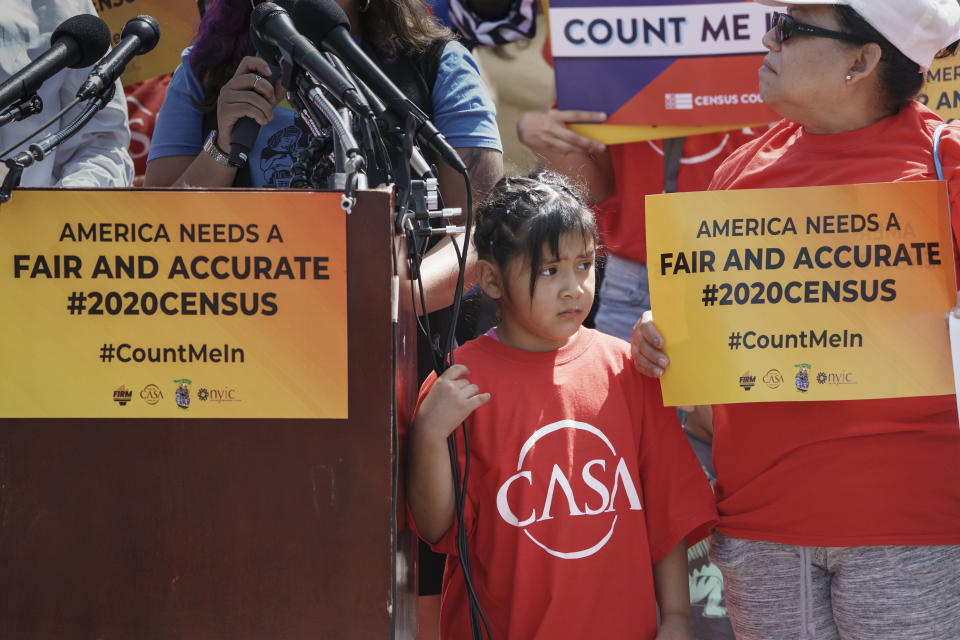Justices to rule on census citizenship question, with much more than voting rights at stake

When Commerce Secretary Wilbur Ross announced that a citizenship question would be added to the 2020 census, civil rights advocates loudly cried foul, declaring the question, which last appeared on census forms in 1950, constituted surveillance of vulnerable communities. Seventeen states and the District of Columbia sued Ross to block the change, a case that was fast-tracked to the Supreme Court after a U.S. District Court judge ruled for the plaintiffs in January.
In order to meet the deadline for printing census forms, the justices are expected to rule by the end of the current term next month. Legal observers say the justices are likely to allow the question to be added.
Since 1790, when the population of the entire country was less than 4 million, the decennial head count of every person living in the U.S. has helped states determine how federal funds, House of Representatives seats and Electoral College votes are allocated according to population size.
The census count has always included citizens and noncitizens alike, although in early decades Native Americans weren’t counted, and slaves counted as three-fifths of a person for purposes such as allocating congressional seats. Under the change proposed by Ross, noncitizens would still be counted, but the plaintiffs in the court case hold that just asking the question would depress responses from households that include noncitizens, even if they are in the country legally.
But Ross said the citizenship question, which had been requested by the Justice Department and hadn’t been tested for its potential impact on census response rates, would ensure an accurate count of the voting-age population and help enforce the 1965 Voting Rights Act.
In the memo announcing the question, he wrote that “the Department of Commerce is not able to determine definitively how inclusion of a citizenship question on the decennial census will impact responsiveness.” Nevertheless, he wrote, the “need for accurate citizenship data and the limited burden that the reinstatement of the citizenship question would impose outweigh fears about a potentially lower response rate.” Even allowing for “some impact on responses, inclusion of a citizenship question on the 2020 decennial census will provide more complete information for those who respond.”

But an undercount of Latinos and immigrant communities that might be reluctant to hand over their information to the government could affect many things besides legislative apportionment — funding of government programs, siting of schools and hospitals, and even such seemingly unrelated consequences as employment opportunities.
“Having an undercount would be problematic for all of the different data users, whether they be government data users, whether it be local communities that use the data,” said Christine Pierce, senior vice president of Data Science at Nielsen Global Media, a tech company that collects and analyzes data sets for information about population change or population growth. “All of those data sets are ultimately benchmarked to the decennial census.”
“Different employers when they're looking at placing a site in a given location, they'll look at how many people do I have of the working age. How many people do I have of certain population segments?” Pierce told Yahoo News.
“[The citizenship question] can impact not only where employers decide to locate a business, it can also impact retail placement,” she added. “[Businesses] will look to see where do I want to put a particular store, for example, or what goods and services should be available in this neighborhood. Those decisions, whether made by the private sector or community organizations or government organizations, use census data in allocating those resources or determining where to place a site for their employees.”
The citizenship question was previously assessed by the Census Bureau to gauge responders’ concerns about confidentiality, especially among noncitizens, who brought up “topics like the ‘Muslim ban,’ discomfort ‘registering’ other household members by reporting their demographic characteristics, the dissolution of the ‘DACA’ (Deferred Action for Childhood Arrival) program, [and] repeated references to Immigration and Customs Enforcement (ICE).”
A test census form will be sent to approximately 480,000 housing units this summer “to measure the operational effect of reinstating a citizenship question on self-response rates,” according to the Census Bureau, but the wording and placement of the question were not tested before it was added, which is a “fundamental concern” of Pierce as a data scientist.
“The decennial census is the largest peacetime operation that the government carries out,” she said. “It’s a huge operation and the planning for that has to occur years in advance and that planning includes testing of the questions to make sure that people understand them and make sure that they understand what the impact of any additional question would be.”
“If that data from the census bureau is not correct,” she added, “all of these different industries (manufacturing, retail, telecommunications) could end up underestimating the growth or underestimating the presence of different segments of the population that are more likely to be multicultural.”
This includes the health care industry, which could also be affected by the census citizenship question.
“It's not a health care question explicitly, but actually it has a huge impact on health,” said Ana Tellez, communications director at Human Impact Partners (HIP), a public health organization in Oakland, Calif.

“Federal funding from the CDC and other federal health agencies is determined by the census. If there is undercounting of people, that means states like California or other states where there are larger immigrant populations will get less Medicaid money,” Tellez told Yahoo News. “They'll get less child health care money or CHIP money, resources that go to families who don't meet the low-income Medicaid requirements but don't make enough to afford health care for their kids. The direct consequences there is that a lot of people will have less access to health care directly.”
Additionally, health care companies use the census data to understand the demographics of different U.S. populations and communities, which helps them decide where to place or relocate, for example, hospitals or health centers.
“Another consequence, which is also related to federal funds,” said Tellez, “is that public health researchers use census data to apply for funding for their research. If the census data is inaccurate — as it will be if there's a citizenship question — then they're not going to be able to really do the research that they may do if they could say there's X number of Latinx people living in this district, they can no longer say that. They would be less likely to get funding to research what are actually pretty vulnerable populations.”
Tellez said organizations like hers in California, a state that had an undercount in the last census, are mobilizing to avoid the same pitfall in 2020, including a plan to go door to door in immigrant communities, “telling them that it's OK to respond to the census.”
When asked if the citizenship question would provide a better assessment of who makes up these communities, as the commerce secretary has claimed, and ultimately what they need, Tellez said, “No, absolutely not.”
“The reality is this question because it hasn't been asked in over 50 years so people are not used to seeing it on there, because distrust of the government is a real thing we have to address, and because of the political discourse coming from the federal administrations, the reality is [the census inclusive of the citizenship question] is going to undercount people,” she said.
Tellez added: “If the question does get added, unfortunately, it will have consequences for 10 years. What that means is that people who are on the ground advocating are going to spend a lot of resources and a lot of time that they could spend doing other things, getting people to take the census.”
Meanwhile, a Republican senator is mobilizing to keep the citizenship question on the census after Trump leaves office and beyond the next 10 years.
“This is America,” Steve Daines, R-Mont., told Fox News Wednesday. “We are a sovereign nation. It’s absurd that we don’t know how many citizens and noncitizens are living in this country. That’s why I’m introducing this bill to require a citizenship question on the census — and ensure that states harboring millions of illegal immigrants are not rewarded with additional taxpayer dollars.”
“It makes no sense why a state like California that harbors millions of illegal immigrants is rewarded with additional representation in Congress and taxpayer resources at the expense of more rural states like Montana,” Daines said. “That is rewarding illegal behavior.”
_____
Read more from Yahoo News:


